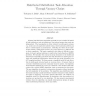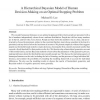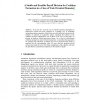994 search results - page 24 / 199 » Modeling task allocation using a decision theoretic model |
ICRA
2003
IEEE
14 years 2 months ago
2003
IEEE
Existing task allocation algorithms generally do not consider the effects of task interaction, such as interference, but instead assume that tasks are independent. That assumptio...
WSC
2000
13 years 11 months ago
2000
Simulation models are often not used to their full potential in the decision-making process. The default simulation strategy of simple serial replication of fixed length runs mean...
COGSCI
2006
13 years 9 months ago
2006
We consider human performance on an optimal stopping problem where people are presented with a list of numbers independently chosen from a uniform distribution. People are told ho...
ATAL
2001
Springer
14 years 2 months ago
2001
Springer
In the last few years the use of coalition formation algorithms in multi-agent systems has been proposed as a possible way of modelling autonomous agent cooperation. Game theory pr...
HICSS
2009
IEEE
14 years 4 months ago
2009
IEEE
The rapid growth of the Internet has made computer-mediated communication popular and the use of e-negotiation systems (ENS) has attracted great attention from researchers and pra...



